Gui Zhi (Vietnamese ) Single Herb Extract, 100g

Gui Zhi (Vietnamese ) Single Herb Extract, 100g
| SKU | CP212 | |
| Brand | Classical Pearls - Single Herb Extracts | |
| Unit Size | 100 Grams | |
| Potency | 10:1 | |
| CAUTION | Note: Classical Pearls are not elgible for any discounts. | |
| Chinese name | 桂枝尖 | |
| Description | Traditional Growing Location: Vietnam Traditional Preparation: Made entirely from the tips of Vietnamese cinnamon twigs, a more potent species than the commonly used Chinese cinnamon; the full potency has not been compromised by the common practice of soaking in water. Excipient: Organic, soluble quinoa powder The cinnamon tree has been one of China’s most important herbal sources since antiquity. The Shanghan lun, China’s most revered herbal classic written 1,850 years ago, deliberately commences its introduction of classical prescriptions with Guizhi Tang (Cinnamon Decoction). According to the theory of flavors put forward in the Tangye jing, another influential herb primer from the formative period of Chinese medicine, pungent medicinals have the ability to stimulate the moving power inherent in all life forms. Perhaps more than any other plant, cinnamon’s unique fusion of sweet and spicy flavors have made it a general symbol of yang qi in China. It grows only in the deep South, and is therefore regarded as a warming “solar” plant that has the ability to drive out all cold, stagnant and evil yin influences. No weeds grow underneath a cinnamon tree, even in the thickest jungle. In addition, the Shen Nong bencao jing, China’s earliest material medica, lists cinnamon as one of the few materials that has the ability to “tong shen” (invigorate mental function and establish connection to the spirit world), a fact that has been incorporated into the Chinese name of the plant. Gui literally means “the plant that is shaped like the ritual jade instrument Gui, and which in similar fashion can establish connection to the spirit world.” In the beginning, primarily the branches of the plant (Guizhi) were used for medicinal purposes and recorded as a major ingredient in the prescriptions of the Shanghan lun and other herbal classics. It was not until the 7th or 8th century that cinnamon bark (Rougui) was introduced as a medicinal substance in China. While Guizhi is generally associated with a primarily moving effect (opening without being too dispersing for spleen deficient individuals), Rougui has traditionally been considered to be a tonic that anchors kidney yang (consolidating without causing stagnation). In general, it can be said that the high value ascribed to cinnamon in ancient herbal classics comes from the plant’s unique ability to mobilize and circulate the body’s life forces while supplementing rather than reducing the body’s yang qi. This quality of driving out excess and warming deficiency at the same time is an exceedingly rare quality when compared to other pungent herbs, making cinnamon materials most suitable for constitutional therapy and the long-term treatment of chronic disease. |
|
| Ingredients | Guizhi 10:1Cinnamon Note: this is a 10:1 herbal extract. When using in a formula with 5:1 extracts, use only a half dose normally used for a 5:1 extract. |
|
















